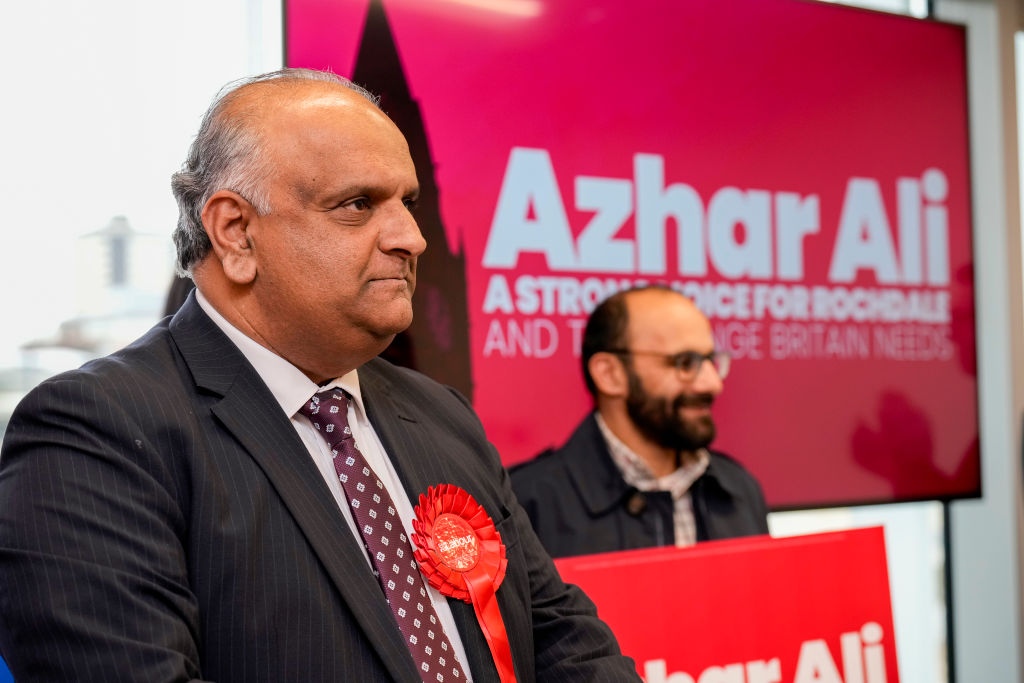“From the river to the sea,” the familiar-hatted figure roars. “Palestine will be free,” his supporters chant in unison. George Galloway is conducting his followers like a religious cleric. “In our thousands, in our millions,” the high-priest cries. “We are all Palestinian,” they respond.
It is rare these days for a foreign issue to be so central to a British political campaign: two by-elections being fought this week — in Wellingborough in Northamptonshire, and in Kingswood near Bristol — will be decided by the economy and other domestic concerns. The battle for Rochdale, which will be fought at the end of this month, is the exception.
The former textile town, in the Pennine foothills north of Manchester, is Labour’s biggest problem between now and the next general election. At the weekend, The Mail on Sunday published a recording of its candidate Azhar Ali telling a meeting of party members that Israel had “allowed” Hamas’s October 7 massacre to take place, to give it the “green light” to invade Gaza. Ali swiftly issued an apology, but it came too late: last night, the Labour Party withdrew its support for his campaign, after receiving “new information” about his comments. All of which makes for a rather peculiar scenario: come polling day, a constituency that has voted Labour since 2010 will not have a Labour candidate on the ballot.
Yet even before Ali’s comments were unearthed, the Rochdale by-election had been tainted by vicious dysfunction. From the moment it was called, after incumbent MP Sir Tony Lloyd died following a long illness, Labour insiders feared — correctly, as it turned out — that it would expose the party’s growing struggle to both retain its loyal support among Muslims and regain the confidence of British Jews. In Rochdale, around 30% of voters are Muslim; beyond the town and across north Lancashire, roughly two dozen Labour councillors have now resigned from the party over Gaza.

Events in the Middle East are far from Labour’s only local trial. There’s also the notorious child-abuse scandal, in which predominantly Pakistani men from the town, many of them gangsters and drug dealers, committed horrific sexual crimes against white, working-class teenage girls over many years, and indeed some are suspected of still doing so. Labour has run the council since 2010 and their councillors have been accused of brushing the issue aside — not least by Simon Danczuk, Rochdale’s former Labour MP, who was suspended by the party in 2017 following reports that he sent explicit messages to a 17-year-old girl. He is now running for the seat under the banners of the Reform Party.
And following last night’s developments, outsider campaigns such as his have been handed a significant boost. Indeed, how different the mood seems from 2019, when, despite losing scores of other northern working-class seats, Labour held Rochdale comfortably, with a majority of almost 10,000. For Starmer to lose such a solid seat, only a few months before the country votes as a whole, will shock and demoralise his party — and rejuvenate his opponents.
Yet the scent of defeat was never faraway. Galloway’s announcement that he would join the fight in Rochdale must have terrified Labour organisers. Galloway, after all, is the most effective constituency campaigner of modern times. For 16 years, he was a Labour MP in Glasgow, before his party expelled him for attacking Tony Blair over the Iraq War and calling the party leadership “a blood-spattered, lying, crooked group of war criminals”.
Galloway took his revenge by moving to London’s East End, where he took the safe Labour seat of Bethnal Green and Bow for his new Respect Party in 2005. Then, in 2012, he contested a by-election in another strongly Muslim Labour constituency — Bradford West — and scored the most spectacular by-election victory of modern times, with a swing of 36.6%. He almost repeated his success three years ago in Batley and Spen, when, despite running a campaign accused of homophobia, he won almost 22% of the vote and gained so many ex-Labour Muslim supporters that Starmer’s party held on by barely 300 ballots.
“There’s a Labour mafia in Rochdale, run by total inadequates,” Galloway, now standing for the Workers’ Party, tells me when I visit his campaign headquarters in a Suzuki showroom. Despite the pro-Palestine chants at his launch rally, Galloway claims, “this by-election is about Labour, not about Gaza… Labour’s name is mud here. Gaza is just the hat on it.”
Is it not also about Rochdale? I ask him if he has any links to the area. Well, he replies, one of his daughters was born locally — during his 2017 campaign for Manchester Gorton. And then he tells me he was a Manchester United season-ticket holder. “Really?“ I reply. “I go to most United games, and I don’t ever recall seeing you there.” He smiles.
Galloway seems just as unconvincing when he denounces his now-suspended Labour opponent. “Labour picked the wrong candidate,” he says a few days before Ali’s October 7 comments come to light. He then claims that Ali has to canvas alongside a minder who acts as his translator because he is a Gujarati Indian and doesn’t speak Urdu or Kashmiri like most Muslims in Rochdale. But this is simply not true, as Ali’s agent told me later: “Azhar was born in Burnley. His mum and dad came from Pakistan, and he doesn’t speak Gujarati. But he can speak Urdu and Punjabi.”
Yet this is how Galloway has always campaigned: in an aggressive and, many believe, unbecoming manner. It’s curious, for instance, that while Ali’s campaign literature doesn’t mention Starmer once (he is instead pictured with deputy leader and nearby MP Angela Rayner), Galloway’s glossy leaflet mentions him eight times. Starmer is, it claims, “in the pocket of Israel”.
Such tawdriness is never far from these parts. The town may have birthed Britain’s cooperative movement, conceived by the Rochdale Pioneers in 1844, but in recent decades, it’s become a byword for political scandal and betrayal. It was here that former Prime Minister Gordon Brown was caught describing Gillian Duffy as “a sort of bigoted woman”, the first sign that Labour was losing touch with its traditional working-class base. And it was here that a string of horrific child sex abuse rings were uncovered. It has, as a result, become a petri dish for political disaffection, a mood which culminated in 60% of the area voting for Brexit.
“Rochdale has been badly let down by Labour in local government,” says Danczuk. He claims two Labour councillors are being investigated for sexual harassment. “Is the Labour parliamentary candidate going to challenge it, or cover it up?” When I ask about his own suspension from Labour, Danczuk dismisses the allegations as “absolute nonsense”, though he admits to texting three words to the girl that were “inappropriate”. The “real reason” for his sacking, he explains, “was because I’d been Jeremy Corbyn’s fiercest critic”.
In many ways, Danczuk is a similar figure to Galloway. Both are colourful mavericks sacked by Labour after being blunt and outspoken. And both are raffish characters. Galloway has had four wives, while Danczuk is now on his third, having married a Rwandan beauty therapist last summer. Galloway has six children; Danczuk has four. They even use the same turn of phrase to describe the local Labour Party: it’s run “like the mafia”.
But not every voter in Rochdale is convinced by such rhetoric. Tariq, a market trader, says he is “not happy about Labour’s response to the war in Gaza. I know Galloway has been doing well in the community. He’s been visiting takeaways and chicken shops late at night and then the videos are shared all over Facebook.”
Lorraine, who used to work in urban regeneration but is now retired, is more concerned about Rochdale’s interminable crime wave than a distant conflict in the Middle East. “Everybody knew the child abuse was going on,” she tells me. “You can’t get away from the fact it’s Asian men grooming young white girls. A lot of it is gang and drug-related.” She cites a horrific incident in the town recently, when a man had his hand chopped off by a machete after trying to defend an elderly woman who was being harassed by a gang of men. The attacker was convicted, but the gang leader allegedly escaped to Pakistan and has never been caught. “Nothing’s being done. This is what we have to contend with.” Only at the weekend, four boys — aged between 12 and 14 — were arrested on suspicion of raping a young female near the town centre.
How likely is it that any of the candidates vying for Rochdale’s votes will remedy this? Although Labour were the clear favourites until yesterday, few could say how Ali planned to help his constituents. Indeed, Labour were so keen to get this campaign underway — and, one suspects, avoid a drawn-out contest against Galloway — that they ignored the normal by-election convention that, following an MP’s death, the incumbent party doesn’t move the writ until after the deceased’s funeral. Suffice it to say that Labour’s impatience has backfired, an act of self-harm that could wreak huge damage both locally and nationally.
Beyond Rochdale, this latest scandal illustrates a broader threat to Labour. For decades, the party has become dependent on the Muslim vote, which has been well-organised by influential leaders in Muslim communities. That strong support may partly explain why Labour politicians in towns such as Rochdale, Oldham and Rotherham seemed slow and reluctant to clamp down on child sex rings. It may also explain why Labour allowed antisemitism to seep into its ranks, both under Corbyn and now Starmer.
The result is that, thanks to the past few days, we now have an idea of what lies ahead for Starmer. When Labour returns to power, relations between the party and its Muslim supporters are likely to become even more strained. In the meantime, ordinary voters will be caught in the crossfire — and characters such as Galloway will continue to thrive.
Disclaimer
Some of the posts we share are controversial and we do not necessarily agree with them in the whole extend. Sometimes we agree with the content or part of it but we do not agree with the narration or language. Nevertheless we find them somehow interesting, valuable and/or informative or we share them, because we strongly believe in freedom of speech, free press and journalism. We strongly encourage you to have a critical approach to all the content, do your own research and analysis to build your own opinion.
We would be glad to have your feedback.
Source: UnHerd Read the original article here: https://unherd.com/



